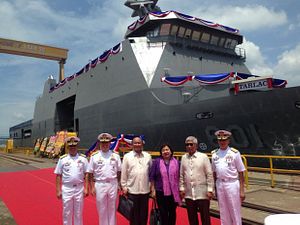Earlier this week, Indonesia and the Philippines signed a new defense industry deal. The agreement spotlighted the ongoing defense cooperation between the two Southeast Asian states and the continued management of the opportunities and challenges in this aspect of their security ties.
As I have noted before in these pages, as Indonesia tries boost the country’s local defense industry, it has been looking to export some equipment to neighboring states. The Philippines has been one of these markets, with agreements already underway for Indonesia to export aircraft and ships in the coming years as Manila looks to urgently boost its military capabilities. While there have been challenges in realizing aspects of this cooperation due to an array of challenges – including delivery timelines and internal defense industry challenges within Indonesia – collaboration has nonetheless continued to progress in some instances.
Earlier this week, we saw the defense relationship in the headlines again with the inking of a new defense industry deal. The two countries signed a memorandum of understanding (MOU) on February 27 in Jakarta to advance defense industrial collaboration between them.
The agreement, described as the Memorandum of Understanding on Logistics and Defense Industry Cooperation, was signed by director of defense potential at Indonesia’s defense ministry, Bondan Tiara Sofyan, and the undersecretary for finance and materials at the Philippine defense ministry Raymundo DV Elefante at the office of the Indonesian defense ministry (KEMHAN) in the Indonesian capital of Jakarta. The signing was also attended by other defense officials, diplomats, and top personnel from Indonesian state-owned defense companies such as PT Pindad and PT PAL.
Per KEMHAN in the official account of the agreeement’s signing, the MOU is intended to serve as “a legal umbrella” for cooperation between the two countries in the defense industry domain, such as in procurement, transfer of technology, and defense material exports. This would further enable Indonesian state-owned companies to offer their products to the Philippines and boost cooperation in fields such as logistics including via logistics purchases through government to government (G-to-G) cooperation between them.
Unsurprisingly, few additional specifics were publicly provided about the agreement, including specific provisions. And its significance will ultimately lie not just in its signing, but how this actually translates into tangible, concrete defense cooperation between the two sides. Those specifics will be important to look in the coming months for in order to assess how this new MOU will actually affect some of the aspects of the broader Indonesia-Philippines defense relationship.

































